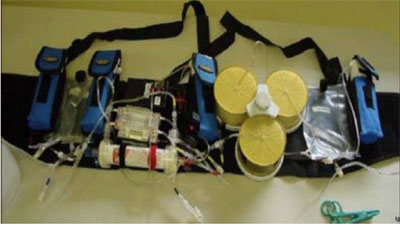
We came across this news release on a wearable kidney belt for portable use. We seem to come across these sort of news items regularly.
Here's an extract from the news at Kidney Org. Australia
Australasian Home Haemodialysis Workshop Brisbane 11-12 February 2010
Dr Carmel Hawley, Clinical Director of Haemodialysis, Princess Alexandra Hospital and Chairman of a major conference in Brisbane on home dialysis said the wearable kidney would be discussed at the conference. The filtration device is worn on a belt around the waist and weighs approximately five kilograms. There are four micro-pumps which are driven by standard batteries.
The belt is manufactured by Xcorporeal Inc (United States), and a presentation by them is available online. You can visit the Xcorporeal website as well. They list several papers they have presented on this topic from 2006 - 2008, but I didn't notice anything more recent.
